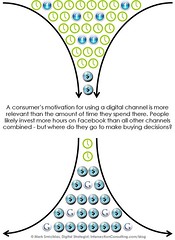The Digital Marketing Guide
How loud can you yell? How outrageous can you be? These are questions marketers have been asking for nearly a century. This paradigm shifted when Doyle Dane Bernbach injected intelligence into advertising in the 1960s with their revolutionary “Lemon” print ad for Volkswagen. For them, it wasn’t about how loud you can yell, it was about how interesting you are. Since the 1960s, there has been a blend of intelligent campaigns, but far outweighed by yelling matches (think Times Square).
With the inception of the web, the thinking that drove real-world advertising shifted to the online space. There was a mix of flashy and intelligent banner ads. But just as Doyle Dane Bernbach shifted attitudes in advertising in the 1960s, we are in a transitional stage in marketing. A new evolution in thinking is emerging in online marketing. It’s not about how flashy your banner ad can be. It’s not about how loud you can yell. It’s about how interesting and remarkable you are. It’s not about saying you’re remarkable. With the influx of peer-to-peer networks, it’s not about you anymore. It’s the value consumers place on your product or brand.
The new thinking speaks to the importance of consumers. It’s about being relevant and speaking to the intelligence of your audience. What does a hair growth product matter to a 14 year-old girl browsing Facebook? It’s white noise. However, what if you offered that 14 year-old girl your product. Given her connections in the social community, it might be worthwhile.
Key Concepts:
Reciprocity and participation – Have an active relationship with others in the community.
If you added an extra zero and a reader calls you out on it, thank them. Intelligent user comments are trying to make your product better. Or, if you’re on Digg and someone asks you to digg something for them, do it. When the time comes you can then call on them to reciprocate. Or, if you’re promoting a new hair gel, go to hair enthusiast bloggers and give them the product to try. Let them make the claims for you. If you’re gel really does help curl hair, it’s much more powerful if a blogger says it than your marketing department.
Ethics — Remember the Working Families for Wal-Mart? Supposedly an organization of Wal-Mart enthusiasts. There are legions of such people, but the Working Families for Wal-Mart were paid to write good things about the national grocery chain. Deceptive? Of course and Wal-Mart paid dearly. Paul Gillin discusses the firestorm of controversy from bloggers and ultimately, tarnished Wal-Marts online reputation in his book, the New Influencer. Honesty is a highly valued commodity in the blogosphere. A company that can recognize mistakes and promptly fix them is one with high merit in the digital world.
Timeliness – Twitter trends come and go. Kanye West was a trending topic for several days and then disappeared until the next kerfuffle. Will Plate, from Command N, discusses the importance of timeliness in the blogosphere. Though Twitter trending topics are hard to predict, there are annual events that are foreseeable. Think about December holidays. It’s the time for giving and charity. Why not create a giving tree on your website, where users can donate time or money for a charity?
Talking to the Blogosphere
As The New Influencers discusses in detail, blogs are an essential marketing tool. There are over 184 million bloggers worldwide. Why? It’s inexpensive, accessible, interactive and engaging. Not only can your company launch a blog, but you can tap into key influencers in the blogosphere to talk about your product. Prioritize which bloggers make the top 10 or 20 “most popular” list. Take example from…
To read more about digital marketing, go to Sparxoo, a digital marketing, branding and business development blog.
Sparxoo is a business blog that inspires breakthrough by tomorrow’s leaders. We are a strategy consulting firm with a pulse on marketing, branding, and development.

